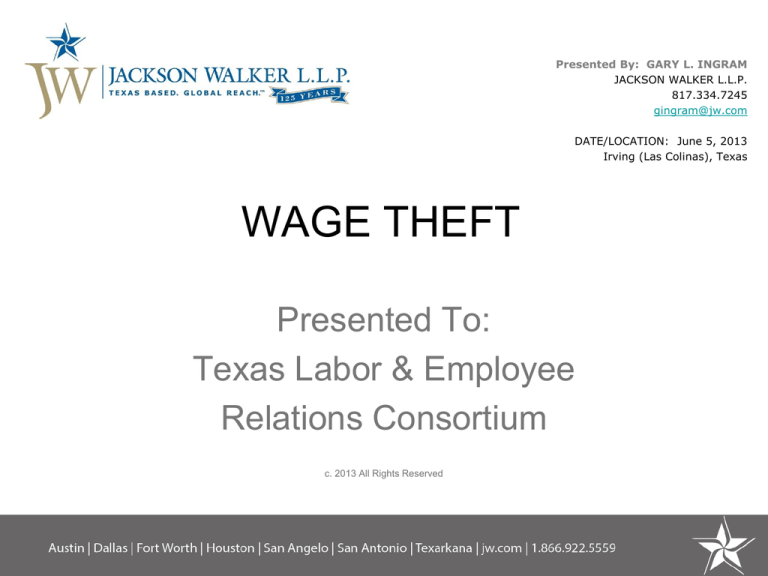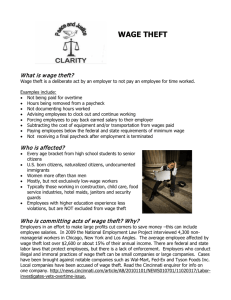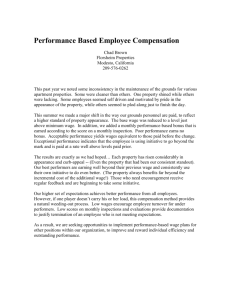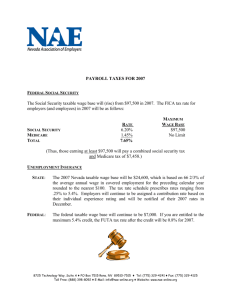
Presented By: GARY L. INGRAM
JACKSON WALKER L.L.P.
817.334.7245
gingram@jw.com
DATE/LOCATION: June 5, 2013
Irving (Las Colinas), Texas
WAGE THEFT
Presented To:
Texas Labor & Employee
Relations Consortium
c. 2013 All Rights Reserved
What is “Wage Theft?”
General Definition
“Wage Theft” occurs
when employers cheat
workers out of wages
owed by various
methods.
Common “Wage Theft”
Examples
Example
Misclassify employees
to keep them from
receiving overtime pay
More Examples
Issuing paychecks that do
not reflect total
compensation owed
OR
Issuing paychecks that
“bounce”
OR
Refusing to issue or
withholding paychecks
(particularly a final
paycheck)
More Examples
Keeping or diverting an
employee’s “tips”
Examples of Wage Theft
Through “Pressure”
Pressure employees to pay to
keep their jobs
OR
Pressure employees to pay for
their own safety equipment
which the employer is
mandated by law to provide at
no cost
OR
Pressure employees to work
“off the clock” to reduce labor
costs
Minimum “Wage Theft”
Occurs when workers are
paid below FLSA minimum
wage ($7.25/hr) because:
1. “Bargain” struck with
employer
2. Paid “by the job” at below
statutory hourly rate required
3. Deductions/offsets/or
“rounding errors” reduce pay
below minimum wage rate
“Wage Theft” by
Time Clock Adjustments
Managers force employees to
work through lunch/rest breaks
and do not treat as time
worked (sometimes referred to
as “the Wal-Mart pinch”)
OR
Managers “rework” an
employee’s work time hours
from day-to-day or week-toweek to avoid overtime
premium pay
Common FLSA “Wage Theft”
Issues
• Joint Employment
(“jobbers,” “day labor,”
“subcontractors”)
• Contingent Workers
(“self-employed
independent contractors”)
• Interns (“trainees,”
“students,” “temp-toperms”)
What’s the Harm?
• 2-3 million American workers
are not being paid required
minimum wage rate
• 3 million workers are
misclassified as independent
contractors
• More than $19 billion in unpaid
overtime owed is “stolen” each
year from employees
• More than $1 billion is paid by
employers annually to settle
unpaid overtime claims
Legal Remedies to Stop
“Wage Theft”
• Fair Labor Standards Act
remedies
• National Labor Relations
Act remedies
• State/Local “wage theft”
laws/ordinances
• Penal Code (criminal)
penalties
Fair Labor Standards Act
• Enforced by Department of Labor
• Primarily addresses civil remedies for minimum wage
and overtime pay violations
• Provides for “collective action” remedies to be sought for
a class of similarly-situated employees
• Provides remedy for employer retaliation against
complaining workers (including “informal” verbal
complaints – Kasten v. Saint-Gobain Performance
Plastics, U.S. Sup. Ct., 2011)
National Labor Relations Act
(“NLRA”)
•
•
•
Enforced by the National Labor Relations Board (“NLRB”)…
NLRB Region 16 office is located in Fort Worth, TX
Section 8 (a)(1) of the NLRA makes it an unfair labor practice for an
employer to interfere with, restrain, or coerce employees in the exercise of
their rights guaranteed in Sec. 7 of the NLRA, including the right to engage
in protected “concerted activities.”
Wage-related examples:
– (A) Wage discussions are protected concerted activities in both unionized
and non-unionized work places
– (B) Having a rule against discussing wages is unlawful, even if no employee
has engaged in protected concerted activity by discussing wages
– (C) Using social media/Internet to engage in protected activities, including
negative or critical comments about employer, may be protected in certain
instances
State/Local Laws Against
“Wage Theft”
• “Wage Theft” has been
described as a “national
epidemic” which has
prompted most states and
many local governments to
enact “wage theft” laws and
local ordinances
• Internet websites and
organized campaigns
focused upon passing
stronger “wage theft” laws
have multiplied
Texas Reponse to “Wage Theft”
•
•
Texas Legislature passed a groundbreaking “Wage Theft Bill” (SB 1024)
which was signed by Gov. Perry May 27,
2011
– Makes it easier for police
departments to arrest employers
who fail to pay their workers in full;
– Closed a legal loophole which
allowed employers to avoid criminal
“theft of services” charges (Penal
Code 31.04) by making a minimal
payment to their workers
Texas Payday Law and Texas Labor
Code (Code § 61.053) provide civil
remedies for victims of wage theft. The
Texas Workforce Commission can order
an employer to pay wages owed if the
employer acted in “bad faith.”
Texas Response to “Wage
Theft” (cont.)
•
•
“Wage Theft” campaigns in El Paso and
Austin resulted in local laws enacting stiffer
criminal penalties and creating task forces
against employers found guilty of wage theft.
– In April 2013, an El Paso roofing
contractor was indicted for alleged
wage theft by the El Paso Wage Theft
task force
– In 2011-2012, the Workers Defense
Project acted as part of an Austin task
force which worked with police to
obtain arrests and indictments for
alleged “wage theft” violations
“Wage Theft” campaigns seeking stiffer
criminal penalties and wage theft
indictments are being spear-headed by the
Workers Defense Project in Houston and
Dallas
New Texas Legislation Aimed at
“Wage Theft”
•
SB 340 (By Rodriguez, Vande Putte):
– Would make administrative penalties mandatory for “bad faith” wage
theft violations if employer:
• (1) has a history of previous wage violations
• (2) fails to pay wages as an act of discrimination or retaliation
• (3) fails to pay wages to multiple employees at the same time
• (4) fails to pay wages knowing such failure was a violation of state
law
• (5) shows “reckless disregard” for the requirements of state law
Note: In 2012, the Texas Workforce Commission found “bad faith” in less than
12% of the 1,028 cases filed; current law does not define “bad faith.”
Note: SB 340 was pending in a House committee at the end of the legislative
session, and it is unclear if it will be considered in a Special Session.
Other Wage-Related Legislation
• HB 950: Passed and sent to Gov. Perry for signature –
would extend the time limit for filing claims of pay
discrimination to include each pay period in which an
allegedly discriminatory underpayment was made
(regardless of when the practice began) – similar to the
federal “Lilly Ledbetter” statute








